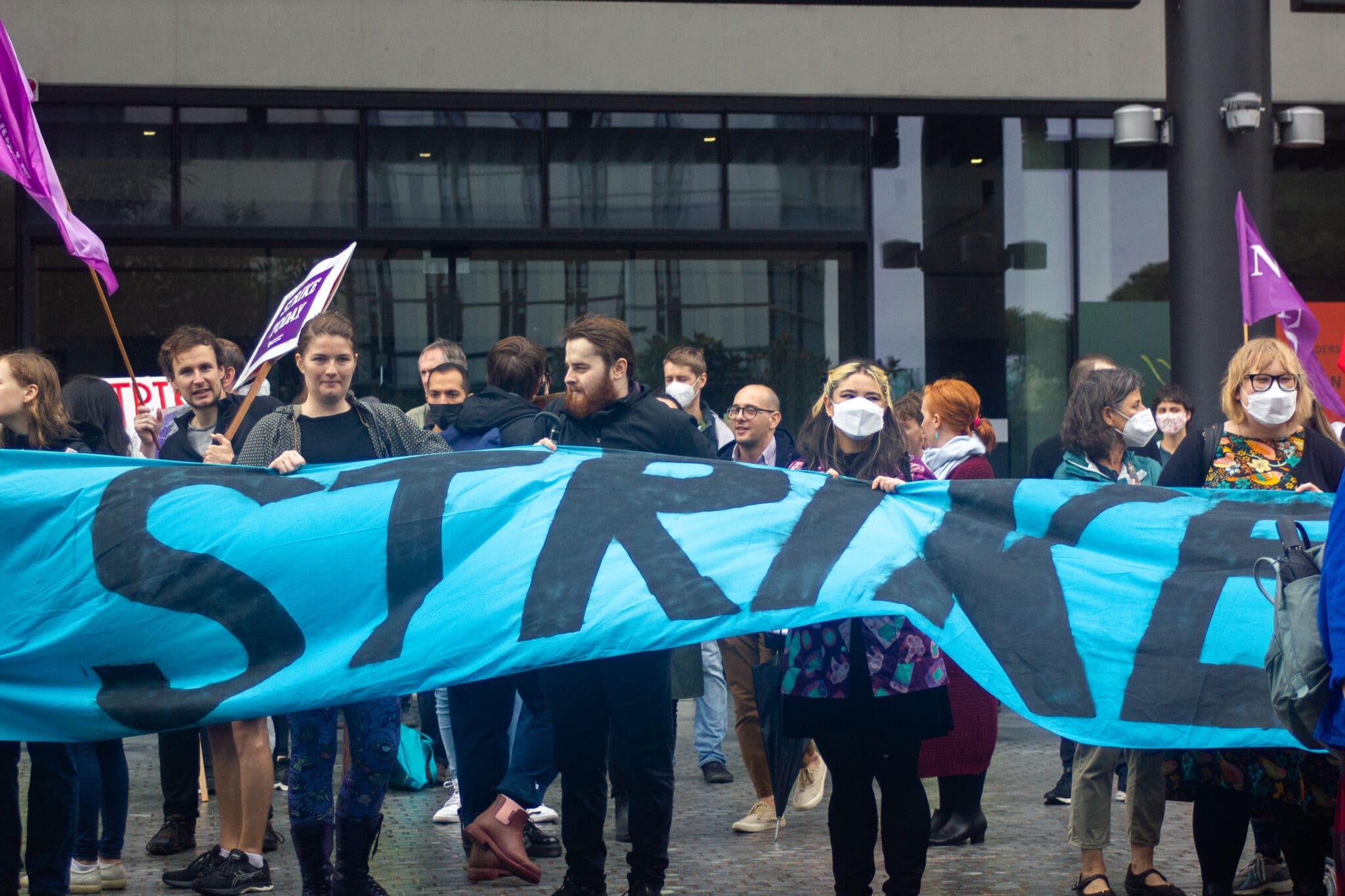Hundreds of staff and students mobilised to shut down the University of Sydney’s operations today as part of a 48-hour cross-campus strike organised by the National Tertiary Education Union (NTEU) for better working conditions. Strikers formed picket lines blockading entrances to Camperdown campus and the Conservatorium from 7am to 1pm.
The majority of classes were cancelled in advance of the strike, with some held online instead. Picketers prevented individuals on foot and in vehicles from entering campus, with NSW Police intervening to turn several motorists away.
Nick Riemer, President of the NTEU’s USyd Branch, positioned the strike as a fight “for a more democratic, less overworked and more secure university.
“We’re striking to get the working conditions that will benefit students,” Riemer said.
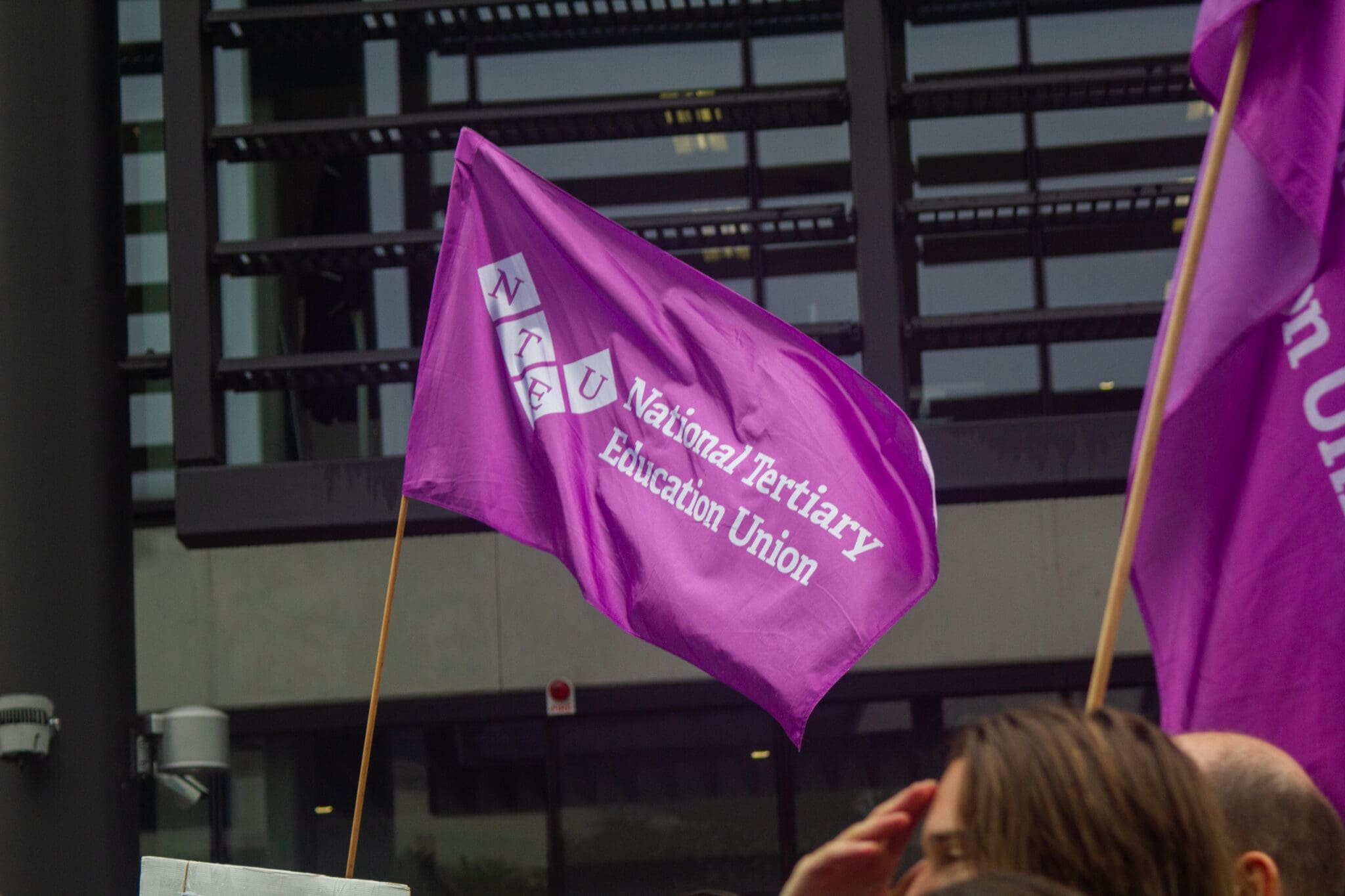
The strike was organised in response to USyd management’s failure to meet the NTEU’s demands in the ongoing Enterprise Bargaining process, including protection against forced redundancies, an end to exploitative casualisation, and a fair pay increase.
Strikers congregated at seven entryways to Camperdown Campus: City Road at Eastern Avenue and Barff Road, Carillon Avenue at Western Avenue, Parramatta Road at the Ross Street Gate and Footbridge Theatre, and the Quadrangle entrance via Victoria Park.
Activists also engaged students attempting to enter campus in discourse regarding the importance of unified student support of strikes, and how crossing the picket would undermine the weight of the industrial action. Honi understands that of the few students who travelled to campus, the vast majority were convinced by picketers to return home.
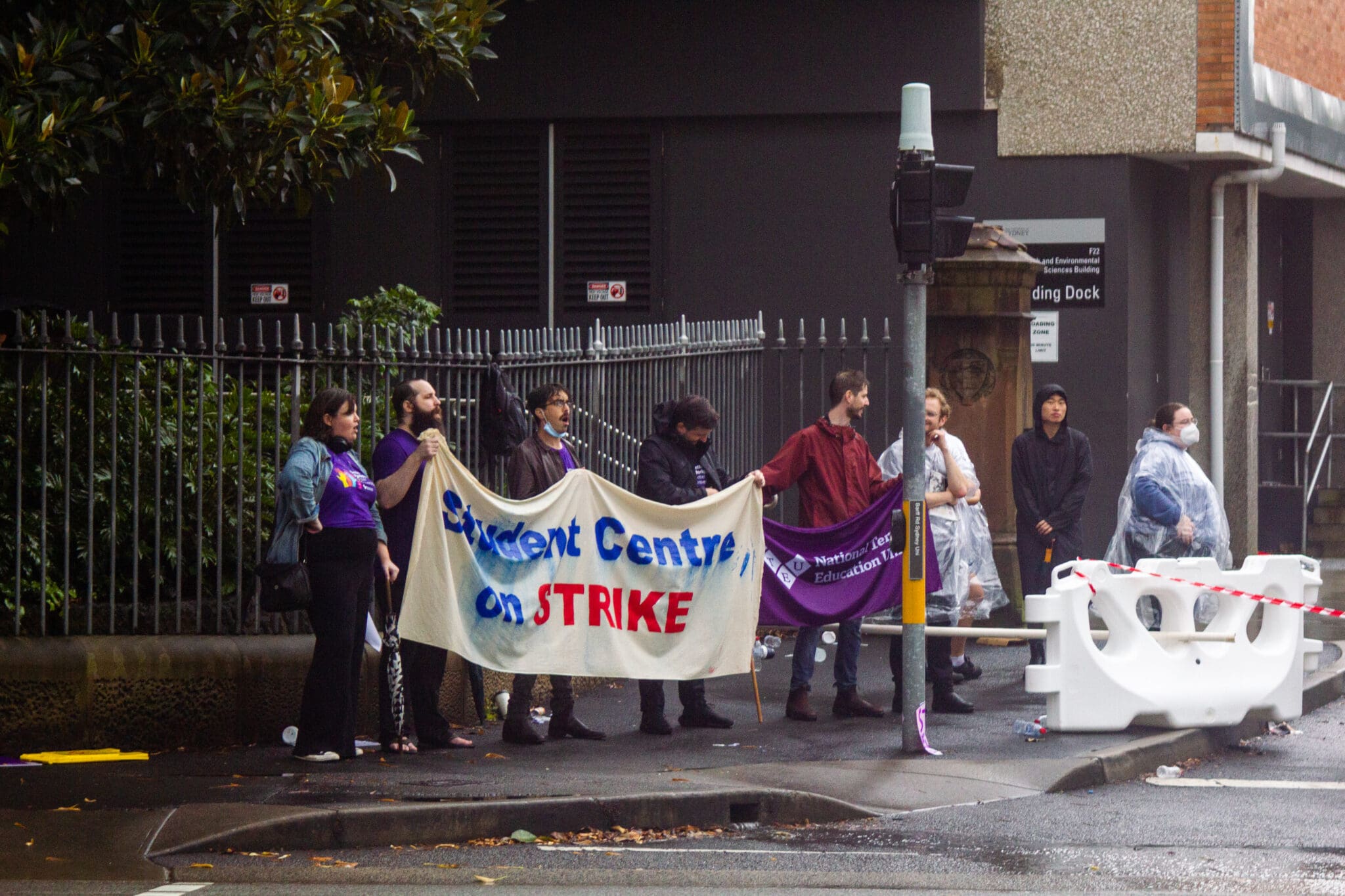
Police intervene as motorists attempt to break pickets
Two to four NSW Police officers were stationed at all of the pickets but Victoria Park. At least 18 officers were witnessed on campus.
Several motorists attempted to enter campus via Western Avenue, the Ross Street Gate and Barff Road but were confronted by a line of picketers. While many turned around after speaking to picketers, some motorists attempted to force their way through.
At the Ross Street Gate, a motorist in a dark four-wheel drive inched beyond the picket border and came into contact with multiple strikers who held the line by pushing against the advancing vehicle.
In all situations where motorists refused to comply, police officers approached drivers and instructed them to turn around. One officer was overheard saying “the line won’t move”.
Aside from turning away vehicles, police officers adopted a passive supervisory approach to the picketing, with many simply looking on from a distance.
In 2020, riot police officers chased, assaulted, and fined USyd students on Parramatta Rd and Eastern Ave amidst protests against the Federal Government’s Higher Education Bill. In 2021, police brutality on Broadway disrupted USyd’s participation in the Global Climate Strikes.
School excursion supports strike, UniSport AGM breaks picket
A high school excursion attempted to enter campus via Victoria Park, where picketers explained the importance of holding the picket line. The visiting students and their supervising teachers consequently joined the picket.
Honi also received reports from multiple pickets of members of the public joining the strike after speaking to activists.
Meanwhile, UniSport, Australia’s central body for university sporting organisations, coincidently held their Annual General Meeting during the strikes at the Refectory in the Holme Building. Attendees crossed the picket despite discouragement from strikers, and the meeting was interrupted by a contingent of activists.
Greens Party politicians arrive to picket
NSW members of the Greens Party joined activists and union members throughout the day in solidarity with the NTEU on strike.
“I’m here today joining the picket because I believe that workers and people in our community deserve the right to strike,” said Jenny Leong, Member for Newtown.
“We deserve our universities to be properly funded. We want our university academics and our administrative staff to be paid properly, but we also need to reduce the pressure on staff and the amount of extra work they’re doing that they’re not getting paid for,” Leong said.
“We also need to recognise that casualisation is a real problem and students’ education suffers, and our society suffers if we don’t have a high quality, free public education system.”
Former NSW Greens MP and lead Senate candidate David Shoebridge was also present at the pickets to speak on the Greens’ plan for supporting universities.
Greens Senator Mehreen Faruqi also joined the pickets and commended the NTEU for taking collective action.
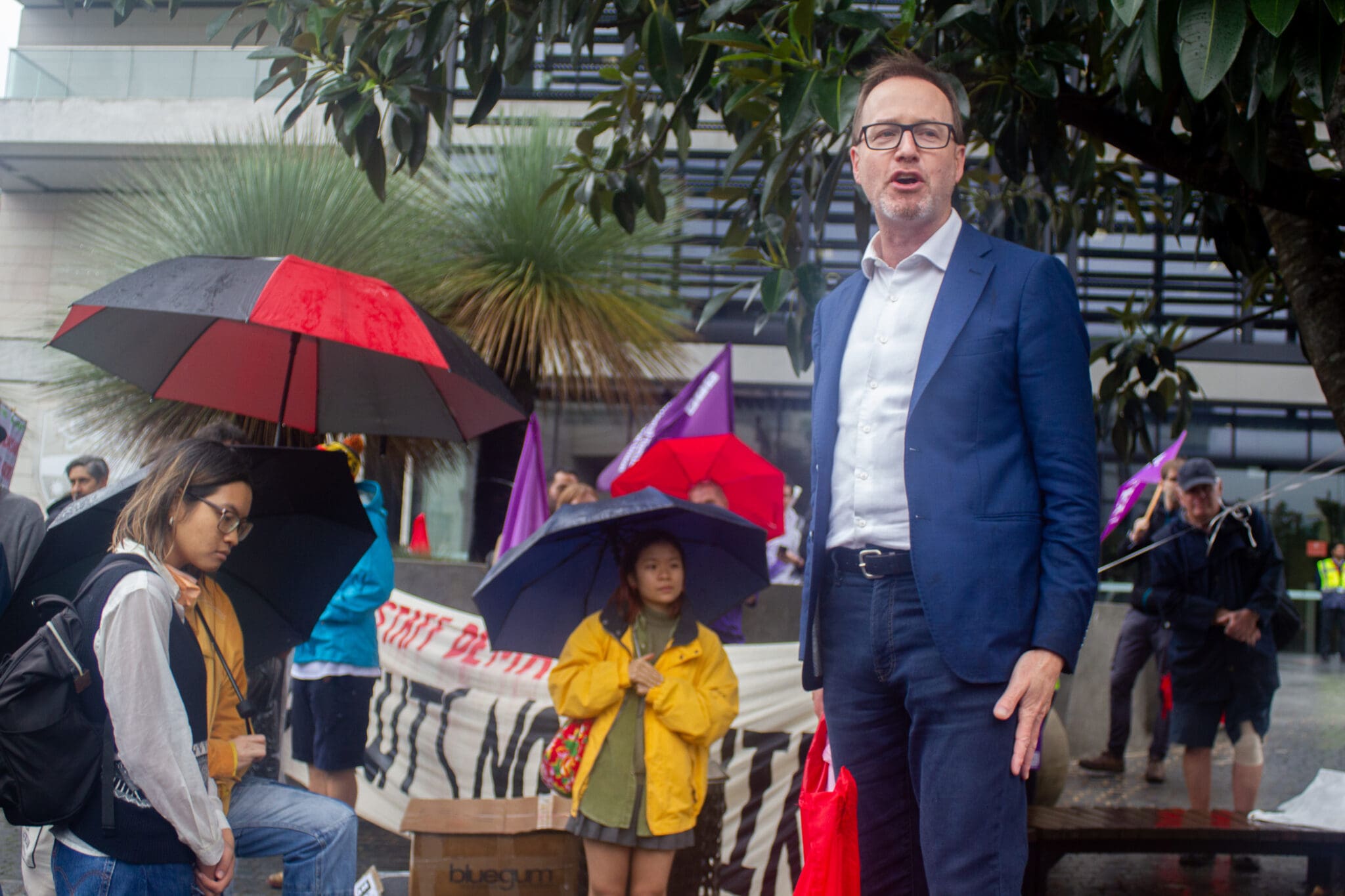
Conservatorium bands together with strikers
Students and staff at the Conservatorium of Music (Con), one of USyd’s satellite campuses formed their own picket lines today in support of the NTEU.
Senior lecturer Dr James Humberstone said that this was the first time the Con, a traditionally conservative campus, would be participating in such strike action.
“We should be here bringing joy to the world, making amazing music and doing incredible world-class performances and representing Australia on the world stage,” Humberstone said.
“We just can’t do that work when we’re having more and more stuff shovelled on us from the managerial class at the university.”
Chris Coady, a permanent lecturer in musicology, spoke on the history of musicians striking within the industry and commended staff and students for continuing that legacy.
“When I think about my metaphorical bandstand, I think about the casual tutors; I see them all holding trumpets in the back row. I think my trombonists are the professional staff that I work with every day. I see my academic colleagues all holding saxophones, under enormous pressure to perform their jobs,” Coady said.
“And I think about how strong we are when we stand together and fight for what’s right.”
Students from the Chinese Music Ensemble and the University of Sydney Chinese Orchestra (SUCO) also showed their solidarity by playing instruments between speeches.
“None of the Chinese music lecturers are part-time, let alone full-time staff members,” said Con student Alexander Poirier. “We don’t have enough instruments because the main campus refuses to send money to the Con.
“We decided to perform because that was a way of us showing solidarity in a very Con way.”
Nick Riemer was also present at the Con pickets, leading protesters in a rendition of the left-wing anthem L’Internationale, an anthem of the socialist movement since the late nineteenth century.
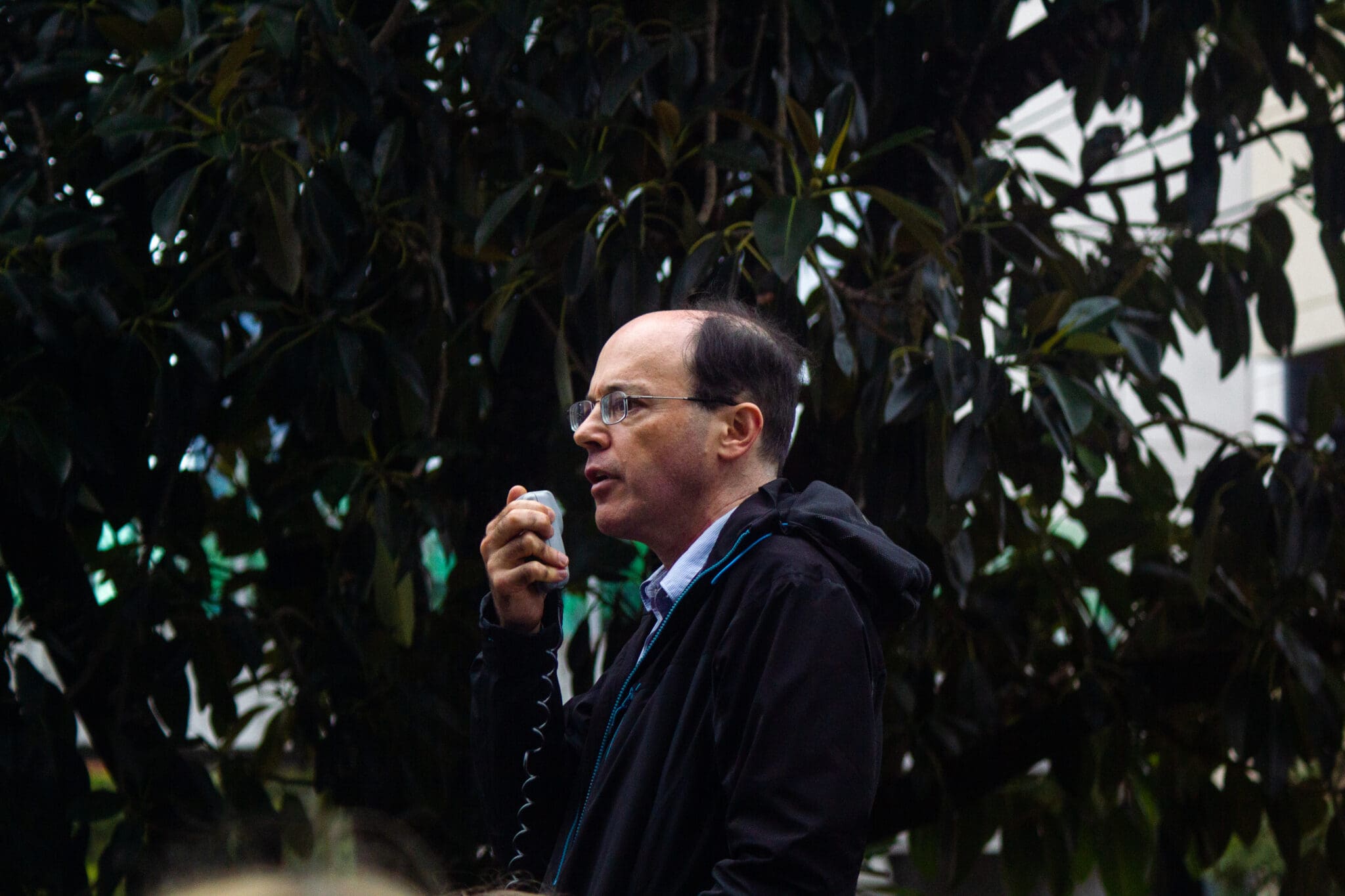
Pickets congregate for City Rd rally
Activists from across the various pickets rallied at City Road in front of the Michael Spence Building (F23) after midday to listen to a series of speeches from various staff, students and union leaders.
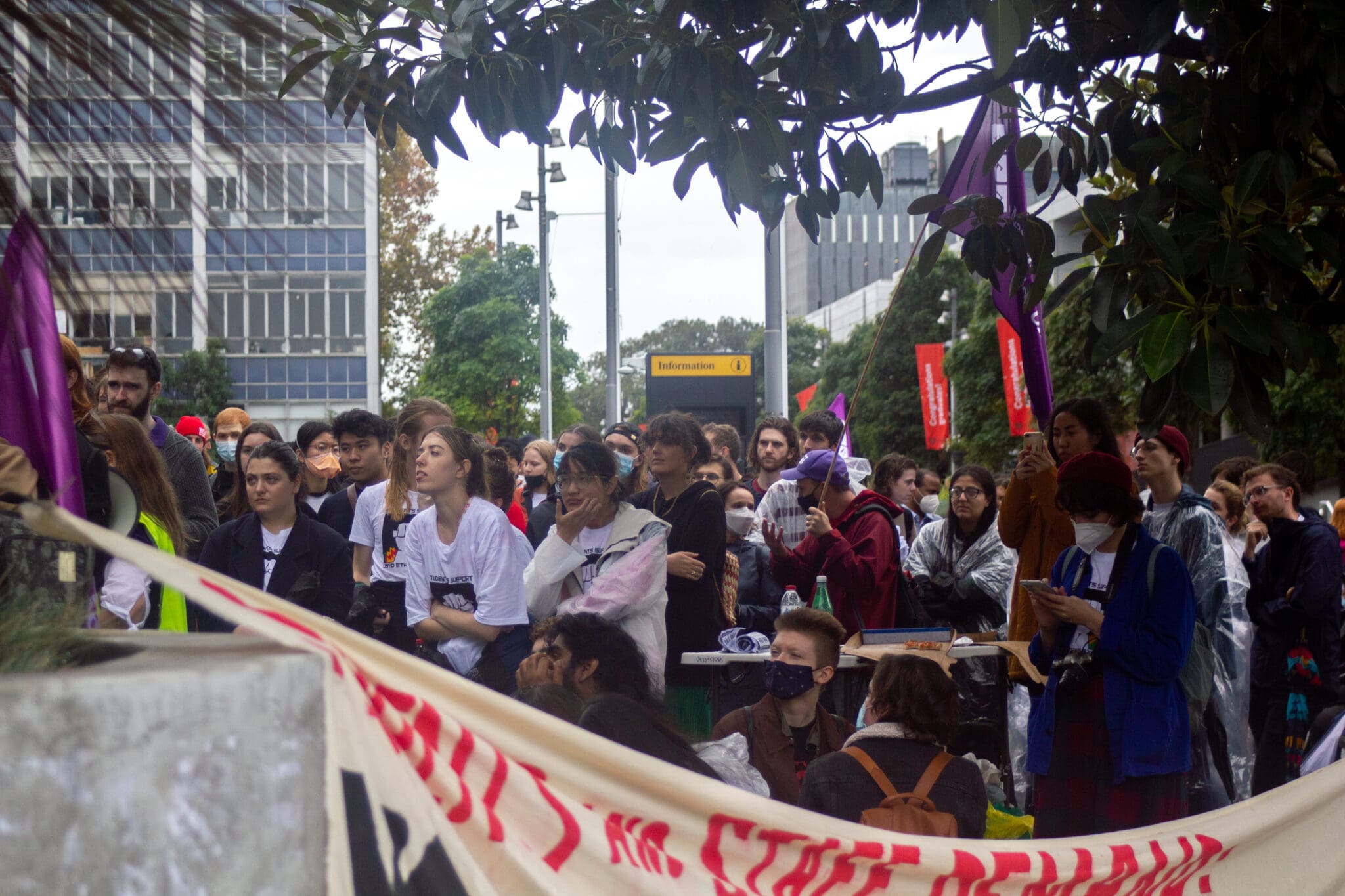
“This strike is not just for the University, but for higher education across the country,” Nick Riemer said.
NSW NTEU Secretary Damien Cahill called today’s strike “one of the best strikes we’ve had at the University of Sydney”, and explained why it was crucial that staff and students vote in a new government in the upcoming federal elections.
“First, we need a properly funded system of higher education. The Coalition government has been waging war on universities ever since it was elected,” Cahill said.
“In 2013, it cut funding to universities in real terms by 2.5 per cent. When the pandemic hit, it shamefully went out of its way to deny Jobkeeper to universities not once, not twice, but three times.
“When universities were haemorrhaging, the government looked the other way. It poured petrol on the fire,” he said.

Cahill also spoke on the need for better industrial relations laws: “In Australia, we have one of the worst and most punitive set of industrial relations laws of any democratic country anywhere in the world.
“Our laws are designed to prevent what’s happening today from happening. We need the right to strike. We need industry wide bargaining,” he said.
He also spoke on trends of corporatisation within the higher education sector, criticising the dominance of university governance and senate members “on the big end of town”.
“Our universities are dominated by the head of the biggest mining corporations in Australia. Dominated by the biggest financial corporations in Australia. And at the head of that are the vice-chancellors,” Cahill said.
The crowd also heard from SRC Education Officers Lia Perkins and Deaglan Godwin, who spoke on the need for student solidarity with striking staff.
“What we’re doing today is learning. We’re on the picket lines. We’re learning way fucking more than we could be learning in class today,” said Perkins.
“The University likes to sell students ideas of leadership. Leadership is a culture, not a person. It tries to sell us a product that we should refuse. We should be fighting for our education every single day.”
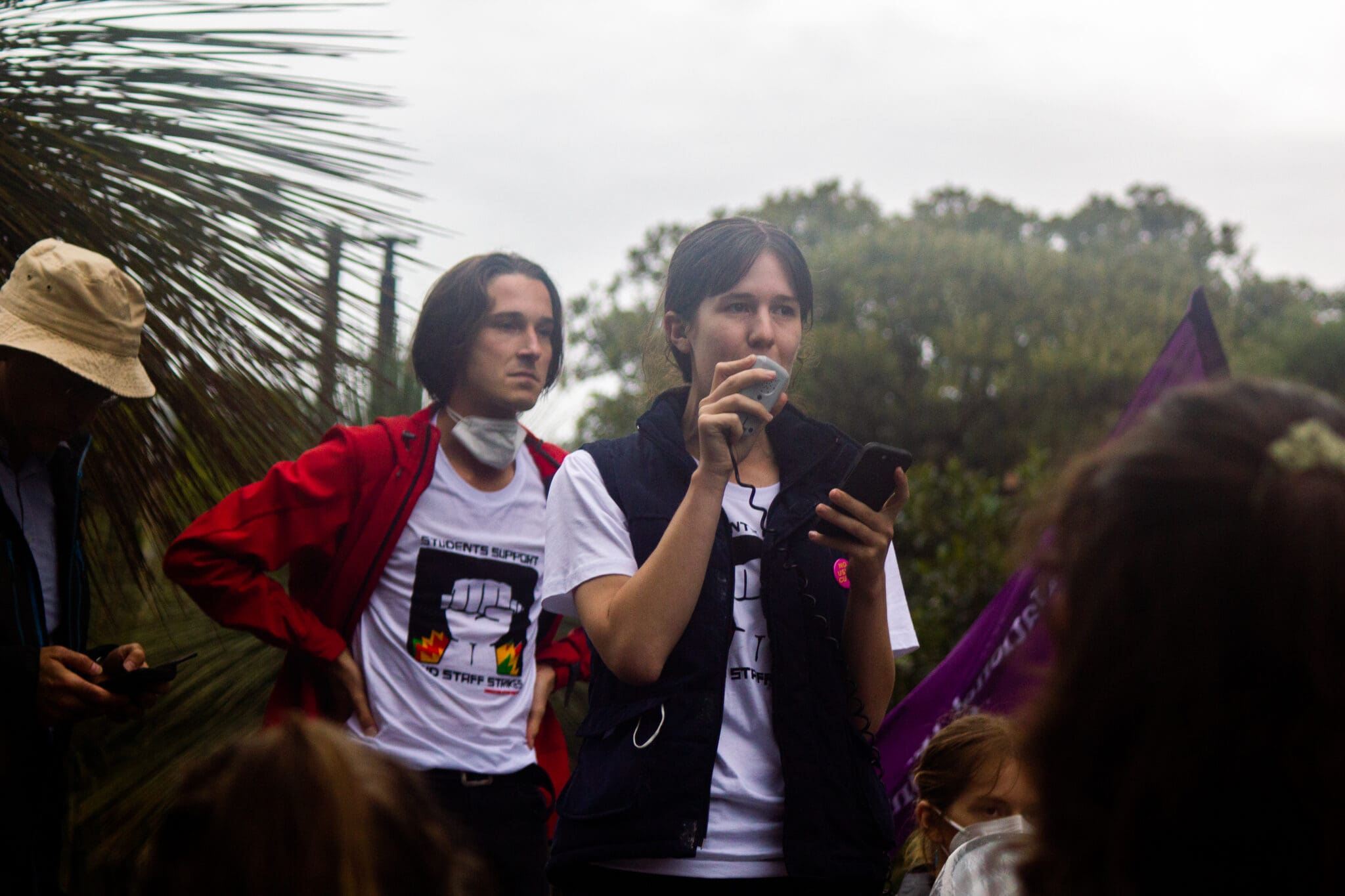
Godwin echoed Perkins’ sentiments: “This University is divided by class. The people up there – Mark Scott on his $1.15 million salary, Annamarie Jagose and the other senior management – who have no interest but in rationalising our University and making it more profitable.
“They might run the University. But staff are the ones who do everything. They’re the ones who teach the classes, who answer the emails, who mark the essays, who run the administration system. Staff make this university run,” said Godwin.
Other union members, including the Australian Services Union (ASU), also joined NTEU members at the rally.
“ASU and NTEU members have a proud history of supporting each other,” said ASU Assistant Secretary Judith Wright. “We are proud to be joining you today and supporting you,”
The crowd also heard from permanent and casual staff who have been affected by casualisation and the University’s course cuts.
“Our department was the only Department of Writing Studies in Australia, and it’s now been abolished,” said Associate Professor Susan Thomas.
“[Permanent staff] have so many rights and freedoms that other [casual employees] don’t have. To be paid one hour for every 4500 words they mark is just unreasonable,” she said.
Gender and Cultural Studies casual staff member Finola Laughren echoed this sentiment: “Casual tutors aren’t paid to even reply to emails from students. Casual tutors aren’t paid to attend lectures. Casual tutors are not paid for doing pastoral care, which we know is such an important component of education.
“Casuals do so much unpaid labour precisely because we cannot deliver to students the quality of education that they deserve on the basis of paid hours that we’re given by our formal contracts,” Laughren said.
The rally concluded with the crowd chanting: “NO ONE IN NO ONE OUT, SHUT THE UNI DOWN”.
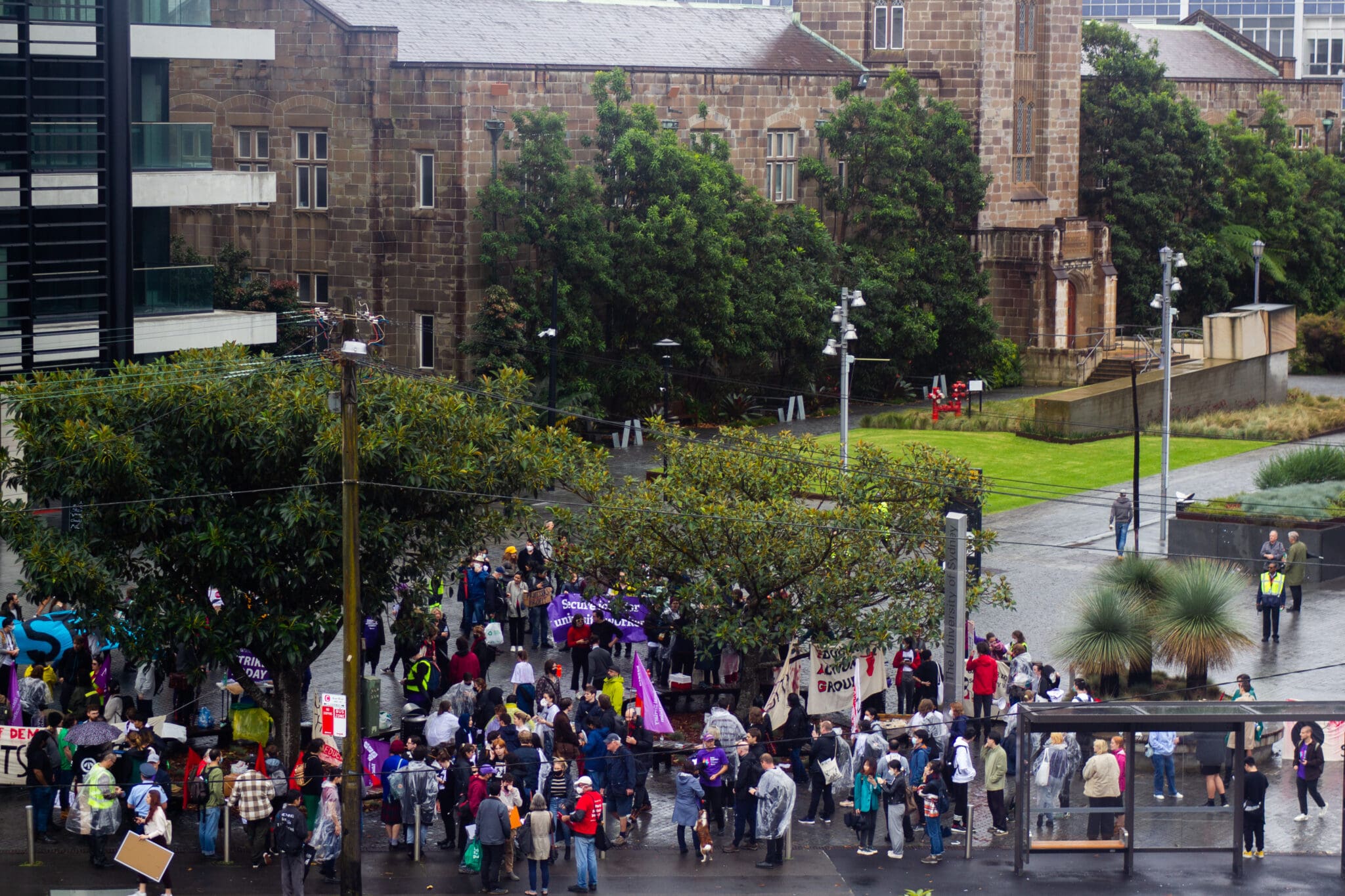
NTEU Demands
According to the NTEU, the University has yet to meet several key demands:
- An end to forced redundancies;
- Enforceable controls on workload for all staff;
- Preservation of the right to a 40% research component in academic workloads;
- An end to exploitative long-term casualisation;
- Recognition & improvement of work from home rights for professional staff;
- An end to disruptive change management and performance review practices;
- Enforceable targets for Aboriginal & Torres Strait Islander employment and;
- A fair pay increase.
Strike resumes tomorrow
The strike resumes for its second and final day at 7am tomorrow at the same locations. The NTEU is accepting donations in person to support casual staff losing wages by striking, already raising $7,000 for strikers.
“This, today, feels good,” said Riemer, who chaired the rally. “But it’s not always going to feel like this. We have had a fantastic day but we need to hold our nerve.
“I look forward to seeing you back here at 7am tomorrow,” he said.




